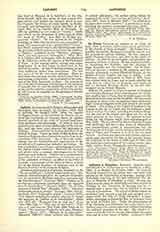

Laforet , NICOLAS-JOSEPH, Belgian philosopher and theologian, born at Graide, January 23, 1823; died at Louvain, January 26, 1872. After the regular theological course at the seminary of Namur, he entered the University of Louvain, where he applied himself especially to the study of Oriental languages, Holy Scripture, and philosophy. In 1848, he was appointed to the chair of moral philosophy at the university, and, the same year, received the doctorate in theology. Two years later he became president of the College du Pape. Upon the death of Msgr. de Ram, the bishops of Belgium chose Laforet to succeed him in the rectorship of the university. One of his main undertakings was the foundation and organization of the schools of civil engineering, industry, and mines. He also established a new literary and pedagogical school, the Justus Lipsius Institute. Moreover his example and advice were a constant encouragement for both professors and students. Laforet was a prothonotary Apostolic ad instar participantium, an honorary canon of the cathedral of Namur, an officer of the Order of Leopold, a commander of the Order of Christ, a member of the Royal Academy of Belgium, and of the Roman Academy of the Catholic Religion.
Besides a great number of articles, especially in the “Revue catholique”, Laforet’s main works are: “Dissertatio historico-dogmatica de methodo theologise, sive de auctoritate Ecclesise catholicae tanquam regula fidei christianw” (Louvain, 1849); “Etudes sur la civilisation europeenne consideree dans ses rapports avec le christianisme” (Brussels, 1850); “La vie et les travaux d’Arnold Tits” (Brussels, 1853); “Principes philosophiques de la morale” (Louvain, 1852; 2nd ed., under the title “Philosophie morale”, Louvain, 1855); “Les dogmes catholiques exposes, prouves et venges des attaques de l’heresie et de l’incredulit6” (Brussels, 1855-59); “Pourquoi Pon ne croit pas” (Louvain, 1864; Eng. tr. “Why men do not believe”, London, s. d., and new ed., New York, 1909; Germ. tr. by Vosen, “Der moderne Unglaube and seine Hauptursachen”, Mainz, 1873); “Histoire de la philosophie” (Brussels, 1866-67), which includes only the history of ancient philosophy, the author dying before he completed the work; “Les martyrs de Gorcum” (Louvain, 1867; Germ. tr. Munster, 1867); “Le syllabus et les plaies de la society moderne”, a posthumous work, including the author’s testament (Louvain, 1872).
C. A. DUBRAY

